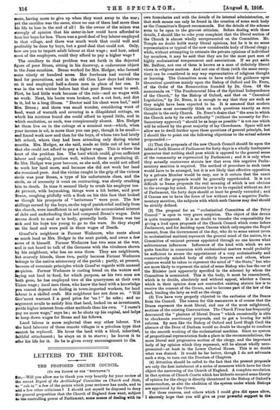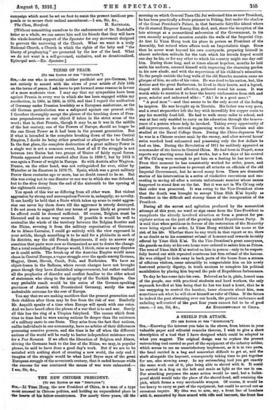LETTERS TO THE EDITOR.
THE PROPOSED CHURCH COUNCIL.
[To THI EDITOR Or THY "SPECTATOR.") you allow me to thank you very heartily for your review of the recent Report of the .Archbishops' Committee on Church and State, to " rub in " a few of the points which your reviewer has made, and to add a few other criticisms ? I should not myself be disposed to deny the general proposition that the Church of England does want, subject to the controlling power of Parliament, some means of dealing with its own formularies and with the details of its internal administration, or that such means can only be found in the creation of some such body as the Committee's Report recommends. But the details of the scheme seem to be open to the gravest criticism. Before dealing with these details, I should like to echo your complaint that the liberal section of the Church is almost wholly unrepresented on the Committee. Mr. Temple no doubt holds many liberal opinions, but he is in no sense representative or typical of the now considerable body of liberal clergy ; while, without attempting to estimate the private opinions of individual lay members, it may be said that they are for the most part men of highly ecclesiastical temperament and associations. If we put aside Mr. Balfour, not one of them is known as a man of definitely liberal views in religious matters. And not one of them (with the same excep- tion) can be considered in any way representative of religious thought or learning. The Committee seem to have relied for guidance upon theoretical questions mainly upon the Bishop of Oxford and Dr. Frere, of the Order of the Resurrection founded by Dr. Gore. Of the memoranda on " The Fundamental Idea of the Spiritual Independence of the Church," by the Bishop of Oxford, and that on " Canonical Legislation," by Dr. Frere, it is enough to say that they are such as they might have been expected to be. It is assumed that modern Christians must necessarily think on such questions exactly as men thought in the early Church. Dr. Frere's desire that " the area in which the Church acts by its own authority " (without the necessity for Par- liamentary approval) " should be as large as possible " is not one which will be echoed by the great majority of lay Churchmen. Space will not allow me to dwell further upon these question', of general principle, but I should like to point out the following objections to the actual scheme propounded :—
(1) That the proposals of the new Church Council should lie upon the table of both Houses of Parliament for forty days is a wholly inadequate guarantee that nothing shall pass which is opposed to the general sense of the community as represented by Parliament ; and it is only when they actually contravene statute law that even this negative Parlia- mentary ;sanction is required. The method of procedure in such cases would have to be arranged, but it is not likely that effective opposition by a private Member would be easy, nor is it certain that the exact purport of the proposals would be generally apprehended. It is not difficult to frame proposals the real meaning of which is not obvious to the average lay mind. If statute law is to be repealed without an Act of Parliament, the forty days should at least be greatly extended ; and if Canons are to have the force of law without even a negative Parlia- mentary sanction, the subjects with which such Canons may deal should be strictly defined.
(2) The proposal for an " ecclesiastical Committee of the Privy Council " is open to very grave suspicion. The object of this device is quite transparent. It is no doubt to transfer the responsibility for giving a lead upon proposals of the Church Council which come before Parliament, and for deciding upon Canons which only require the Royal consent, from the Government of the day, who do to some extent (even in ecclesiastical matters) represent the general mind of the nation, to a Committee of eminent persons appointed through no one knows what subterranean influences. Influences of the kind with which we are quite familiar in connexion with ecclesiastical matters would probably be sufficient to secure the appointment of a very ecclesiastically and conservatively minded body of elderly lawyers and others, whose opinions would be taken to represent the mind of " the State," but who are more likely to represent the mind of some Bishop who has the ear of the Minister (not apparently specified in the scheme) by whom the Committee is nominated. This is the body, it must be remembered, which is to decide, absolutely and without appeal, whether a Canon which in their opinion does not contradict existing statute law is to receive the consent of the Crown, and to become part of the law of the land, binding the laity as well as the clergy.
(3) You have very properly objected to the exclusion of the Deans from the Council. The reason for this manoeuvre is of course that the Deans represent the most liberal, and one of the most enlightened, sections of the existing Convocations. The Church Times has frequently denounced the " phalanx of liberal Deans " which occasionally is able to checkmate reactionary proposals, and to get a hearing for mild reforms. By men like the Bishop of Oxford and Lord Hugh Cecil the absence of the Dean of Durham would no doubt be thought to conduce to the smooth working of the ecclesiastical machine. Since no system of proportional representation finds a place in the recommendations, the more liberal and progressive section of the clergy, and the important body of lay opinion which they represent, will be almost wholly unre- presented—at least in the Lower Clerical House. This is no doubt what was desired. It would be far better, though I do not advocate such a step, to turn out the Proctors of Chapters.
(4) Attention should be called to the fact that the present proposals are only the first instalment of a series of measures which have for their object the narrowing of the Church of England. A complete revolution in that system of Church Courts which has hitherto secured some liberty of opinion for the clergy is directly threatened in the Bishop of Oxford'■ memorandum, as also the abolition of the system under which Bishops are appointed by the Crown.
For these reasons, and others which I could give did space allow, I sincerely hope that you will give us your powerful support In the
campaign which must be set en foot to resist the present insidious pro- posals or to secure their radical amendment.—I am, Sir, &e.,
[Without committing ourselves to the endorsement of Dr. Rashdall's letter as a whole, we can assure him and his friends that they will have the whole-hearted support of the Spectator for any movement designed to prevent the narrowing of the Church. What we want is a truly National Church, a Church in which the rights of the laity and " the liberty of prophesying" are protected by the law of the land. What we do not want is a self-governed, exclusive, and so denationalized, Episcopal soot. —ED. Spectator.)































 Previous page
Previous page